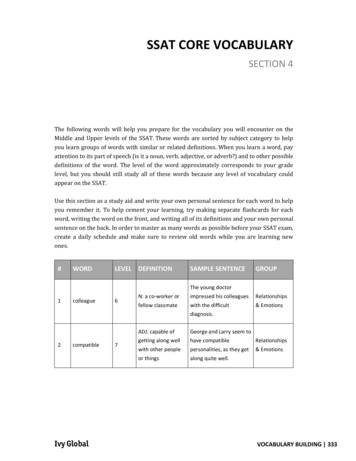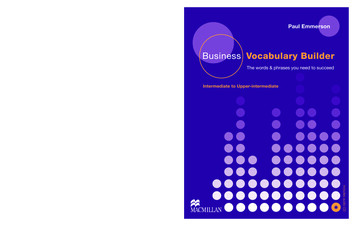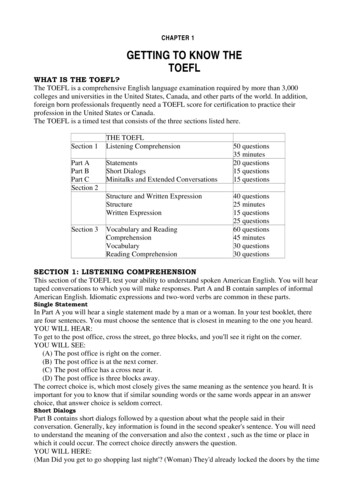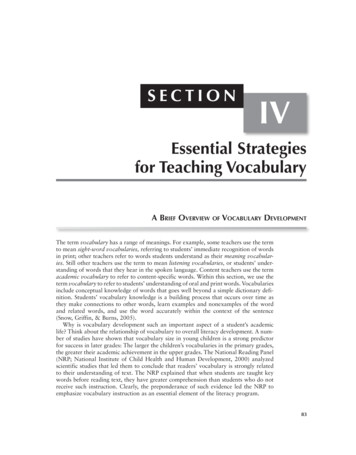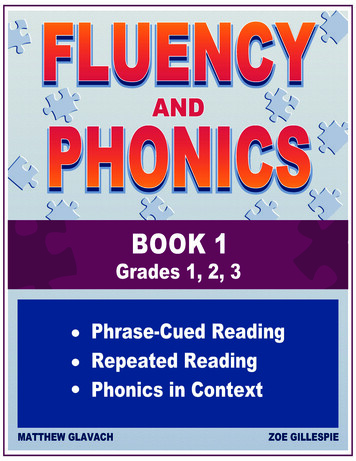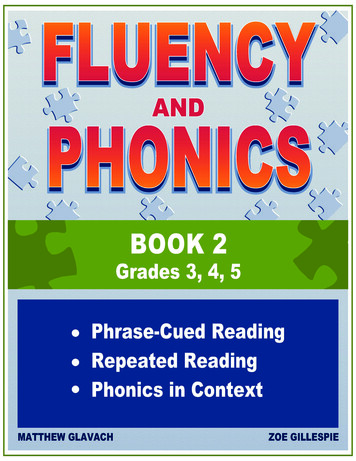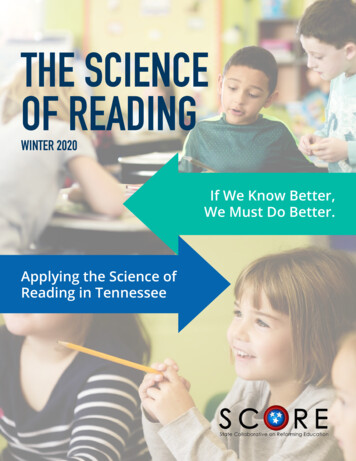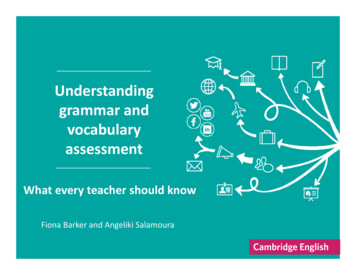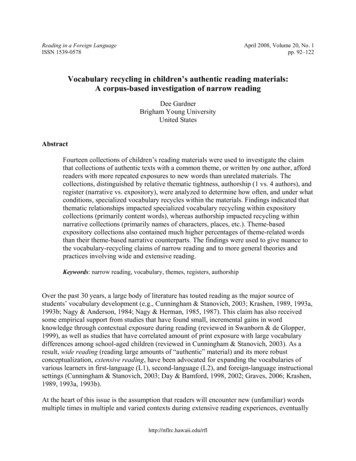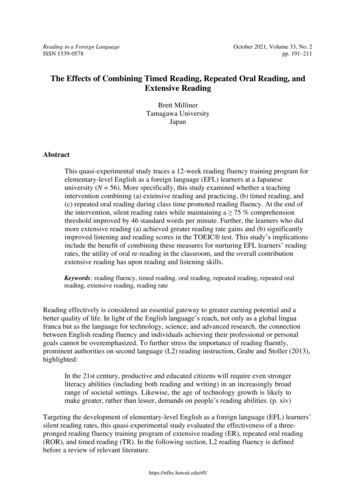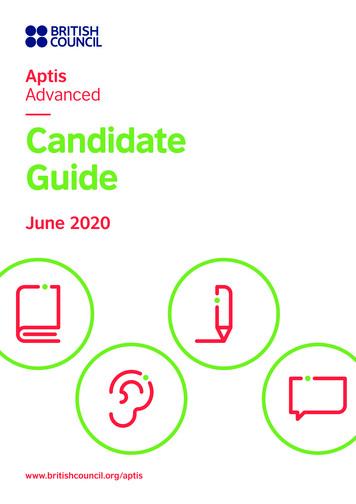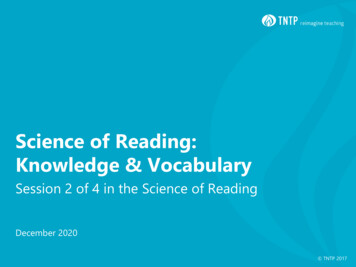
Transcription
Science of Reading:Knowledge & VocabularySession 2 of 4 in the Science of ReadingDecember 2020 TNTP 2017
Kaitlin McDermottNimisha ThakoreKenna McWhirterMeet the TNTP Team
Our Goal:Participants will continue to explore what cognitive science tells us about howstudents learn to read.Participants will walk away understanding: the value of exposing young students tocomplex content and ideas the role content knowledge plays in readingcomprehension how word learning is most efficient whenstudents understand context how leveled reading can create inequities/3
AgendaKnowledge-Building & EquityAcademic VocabularyImplications for Literacy Instruction/4
How We Learn to Read: Building on Session 1/5
Reflect"What if the medicine we have beenprescribing is only making mattersworse, particularly for poor children?What if the best way to boostreading comprehension is not to drillkids on discrete skills but to teachthem, as early as possible, the verythings we’ve marginalized—includinghistory, science, and other content thatcould build the knowledge andvocabulary they need to understandboth written texts and the world aroundthem?"Why might making the shift tobuilding knowledge be important?Why can it be such a difficult shiftfor districts, schools, and teachersto make?/6
The effect of knowledge on reading comprehension is strongGeneral culturalknowledgecorrelates about .50with readingcomprehension testscores. That’s aboutthe same correlationbetween parents’heights and theirkids’ heightsStevens, K. (1980). The effect of background knowledge on the reading comprehension of ninthgraders. Journal of Reading Behavior 9(2)./7
Knowledge MattersWhat are your first impressions of this classroom?What are students learning? Who is engaged?How are 2nd graders able to tackle complex texts and ideas?/8
What are your first impressionsof this classroom?What are students learning?Who is engaged?How are 2nd graders able totackle complex texts and ideas?/9
How big of a role does knowledge and the associated vocabulary play incomprehension?Recht & Leslie (1988) Compared Reading Comprehensionfor Four Categories of StudentsHigh reading abilityHigh reading abilityHigh knowledge of baseballLow knowledge of baseballLow reading abilityLow reading abilityHigh knowledge of baseballLow knowledge of baseball/ 10
Knowledge of the topic had a much bigger impact on comprehension thangeneralized reading ability did.Measure of Comprehension86%81%53%43%high reading ability low reading ability high reading ability low reading ability& high knowledge & high knowledge & low knowledge & low knowledgeSource: Recht, D. & Leslie, L. “Effect of Prior Knowledge on Good and Poor Readers Memory ofText.” (1998) Journal of Educational Psychology, Vol. 80, No. 1, 16-20/ 11
A student’s knowledge is often impacted by their socioeconomic status.In 2014, a study on background knowledge tested Pre-K students’comprehension on texts about birds and found significant gaps between lowerand higher SES students in their comprehension.When those same students were given texts about afictional species called wugs, those gaps in comprehensiondisappeared./ 12
How Knowledge HelpsKnowledge helps readers make inferences and resolve ambiguity.Making Inferences:John's face fell as he looked down at his protruding belly. The invitationspecified ‘black tie' and he hadn't worn his tux since his own wedding, 20years earlier.Resolving Ambiguity:John walked down the steps with care. Jeanine looked him up and down whileshe waited. Finally she said, ‘Well, I'm glad I've got some fish in my purse./ 13
Knowledge also helps readers free up working memory by chunkinginformationWord List 1Word List 2ICBCBSNFBSCTANCBDSCNNFBICIANCAA/ 14
What are the implications ofthis on reading andstoring/processinginformation?/ 15
Knowledge Builds SchemaAny topic that you’ve built a strong schema around is much more likely to‘catch’ similar, applicable knowledge./ 16
What is the connectionbetween knowledge-buildingand equity?/ 17
AgendaKnowledge-Building & EquityAcademic VocabularyImplications for Literacy Instruction/ 18
Academic Vocabulary"Robust academic language gives students access to complextexts and allows them to write and communicate withprecision. The things we know have to be named anddescribed by words when encountered in print." (Adams, 2011)"Building knowledge and domain-specific vocabulary play anessential role in the literacy development of students. To buildthis essential knowledge and vocabulary, students must read,analyze, discuss, and write about a range of conceptuallycoherent topics." (Cervetti et al., 2016; Landauer & Dumais,1997)-20-21 Nebraska Essential Instructional Content ELA/ 19
How is vocabulary a barrier to comprehension?When she was twenty-six, Eliza bought tickets to . Few hadever been there. Eliza wrote for the back home. She lovedsharing the things she saw, such as and the .Eliza even wrote a book – the first about .When Eliza went back to , it wasn’t long before she started thinkingabout again. She decided to visit her older brother, who was workingin . Eliza across the ocean.What do you learn about Eliza from the first paragraph?What is special about the book Eliza wrote?What is the main idea of the passage?/ 20
What is the main idea ofthis passage?/ 21
What’s the main idea of this passage?When she was twenty-six, Eliza bought tickets to faraway Alaska. Few touristshad ever been there. Eliza wrote reports for the newspapers back home. Sheloved sharing the fascinating things she saw, such as huge glaciers, spoutingwhales, and the native people. Eliza even wrote a book – the first guidebookabout Alaska.When Eliza went back to Washington, it wasn’t long before she started thinkingabout traveling again. She decided to visit her older brother, who was working inJapan. Eliza sailed across the ocean.What is the main idea of the passage?/ 22
How did it feel for you to read thispassage and answer these questionswith and without the vocabulary?How do you think it would feel foryour students?What are the implications forreading instruction?/ 23
Knowledge helps build ading or listening to a series of text on thesame topic can yield as much as four timesthe vocabulary growth. (Landauer andDumais, 1997)/ 24
The stronger the schema, the more likely new vocabulary is to “stick”/ 25
Three Tiers of VocabularyTier 3 (DomainSpecific) Wordslava, circumference, legislatureTier 2 (Academic)Wordssaunter, vary, relativeTier 1 (Basic) Wordsbook, girl, fruit/ 26
What’s the main idea of this passage?When she was twenty-six, Eliza bought tickets to faraway Alaska. Few touristshad ever been there. Eliza wrote reports for the newspapers back home. Sheloved sharing the fascinating things she saw, such as huge glaciers, spoutingwhales, and the native people. Eliza even wrote a book – the first guidebookabout Alaska.When Eliza went back to Washington, it wasn’t long before she started thinkingabout traveling again. She decided to visit her older brother, who was working inJapan. Eliza sailed across the ocean.What is the main idea of the passage?/ 27
What’s the main idea of this passage?When she was twenty-six, Eliza bought tickets to faraway Alaska. Few touristshad ever been there. Eliza wrote reports for the newspapers back home. Sheloved sharing the fascinating things she saw, such as huge glaciers, spoutingwhales, and the native people. Eliza even wrote a book – the first guidebookabout Alaska.When Eliza went back to Washington, it wasn’t long before she started thinkingabout traveling again. She decided to visit her older brother, who was working inJapan. Eliza sailed across the ocean.If you knew the Tier 2 words, but not the Tier 3, would yoube better equipped to understand the passage?/ 28
AgendaKnowledge-Building & EquityAcademic VocabularyImplications for Literacy Instruction/ 29
So, what are the implications for K-2 literacy instruction?Expose even your youngest students to complex content andideas by elevating subjects like science and social studiesLeverage texts across disciplines to develop knowledgestudents can use to “chunk” informationUse texts to deepen knowledge of a topic or theme within aunit of study rather than covering a broad variety of topicsStarting with astandard andpicking a text to“teach” to thatstandard.Starting with a complex textand using the standards inservice of understanding thedeeper meaning of that textor topic./ 30
In the early grades, read-alouds of high-quality, complex texts help studentsgrow their knowledge of the world, vocabulary, and oral language skillswhile they develop the skills to access complex text independently.Listening and Reading Comprehension, by Age“Teachers can read aloud to buildstudents’ knowledge of the worldbeyond their scope and to helpstudents make connections fromthe known to the new. There islikely no better way to drawchildren in to the treasures storedin the written word than throughreading aloud to them as much aspossible.”– David Liben, Senior Content Specialist of theLiteracy and English Language Arts team,Student Achievement Partners/ 31
Two Approaches Using Non-Fiction Texts in a 2nd Grade ClassSkills-FocusedLiteracy Classrooms The teacher teaches a mini-lesson oncaptions and how they help studentsunderstand the pictures theyaccompany, including a think aloudof the connections she makes in hermind when she encounters acaption. Students choose non-fiction books attheir level, and complete a graphicorganizer as they read, identifyingeach caption they encounter, andwhat they explain about the picture.Knowledge-BuildingLiteracy Classrooms The teacher conducts a read-aloud on abook about orcas. Throughout the readaloud, she pauses and asks questionsabout what they have learned aboutorcas during the reading. When sheencounters a caption, she brieflyexplains what the structure is, and thatit explains a picture, then asks what thepicture and caption help the studentsunderstand about whales. Students read non-fiction books aboutother types of whales, completing agraphic organizer helps them capturekey facts about the animals as they read.They will include these facts in a writingexercise later in the lesson arc./ 32
How do each of these lessonsincorporate the skill of thestandard?How would engagementdiffer in these two lessonapproaches?/ 33
In a 2nd grade lesson that focuses on non-fiction text / 34
Knowledge matters, and there’s no excuse for not building it in ourclassrooms."If kids are going to spend the next three days reading and rereading aselection about Martin Luther King or why empathy matters or aboutchildren in Brazil—studying the vocabulary, answering questions, practicingfluency—there is no excuse for them walking away from those lessons notknowing who the Reverend King was, what empathy means, or where Brazilis. Reading lessons needs to have double outcomes: an improvement toreading ability and an increased knowledge about whatever was read."--Dr. Timothy Shanahan, Literacy Researcher/ 36
What is one key learning thatyou will apply to your work?What wonderings do you stillhave about buildingknowledge and vocabularythrough text?/ 37
Connect with nkedin.com/company/tntp/ 38
Students choose non-fiction books at their level, and complete a graphic organizer as they read, identifying each caption they encounter, and what they explain about the picture. The teacher conducts a read-aloud on a book about orcas. Throughout the read aloud, she pau
